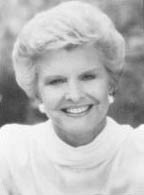Betty Ford
Many of Betty Ford’s Grand Rapids friends-men and women in the generation who lived through the depression years as children and young teenagers and later were involved in World War II- think of her fondly as an attractive and vital woman, and they recall her early years in Grand Rapids with her many friends and activities.
She attended Central High School, one of those excellent Midwestern high schools with the kind of demanding faculty one remembers for a lifetime. As her autobiography, The Times of My Life, points out, she enjoyed learning and those high school years were happy ones.
At the time of life when many young people are still wondering which path to take, Betty Ford knew exactly what she wanted to do: her goal was to become a professional dancer. Later she studied with Martha Graham in New York and became a member of the Martha Graham dance troupe. On the home front she occasionally assisted a dynamic dancing teacher, Calla Travis, who instructed young women and men in what was then called “social dancing”. As Calla Travis’s pupils stumbled self-consciously through the approved dance steps, the waltz and the fox trot, little did they dream that the young woman who demonstrated the dance steps so gracefully was to become the First Lady of the 38th President of the United States and was to be recognized by the whole world for her own accomplishments.
In more recent years, widely known for her broad civic interests, Betty Ford was honored by the Michigan Hall of Fame in 1987 with the following commendation:
As the wife of Michigan Congressman (later Minority Leader, Vice-President and President) Gerald Ford, Betty Ford’s life has been constantly mirrored in the national press. Under the circumstances, she might have confined herself to a social-cultural leadership role (a role for which she was especially qualified as a former member of the Martha Graham dance troupe), but she opted instead to devote herself to public causes such as the Equal Rights Amendment, which she strongly supported. In addition, Betty Ford has been very much involved with the American Cancer Society, the Arthritis Foundation and national programs for mental health and underprivileged children,
Betty Ford has become best known, perhaps, for her courage and candor in coping with personal crisis. When stricken with breast cancer, she faced the situation openly, and in so doing she gave courage to others. Her public acknowledgment of cancer not only called attention to the dangers of the disease for women, but also to its means of detection and treatment.
It is for her personal snuggle with alcohol and drug abuse that Betty Ford has become most widely known and appreciated in later years. She overcame a serious problem of dependency through an exercise of will and courage. The overcoming of her personal problem was not alone sufficient for her, however. As with her cancer, Betty Ford sought ways in which to share her experience with others in a very public and beneficial way. Not only has she devoted her life over the past nine years to the helping of others with drug dependency problems, the funds she has raised through her speaking engagements and ocher public appearances have served to build the Betty Ford Center for Drug Rehabilitation at the Eisenhower Medical Center in California (dedicated October 3, 1982). As President of the Betty Ford Center, she has become a lay expert on the problems of drug abuse and has provided courage, understanding and treatment for countless thousands of individuals who have taken the personal example to heart. And, for this the California Medical Society and numerous other organizations have given her personal citations.

